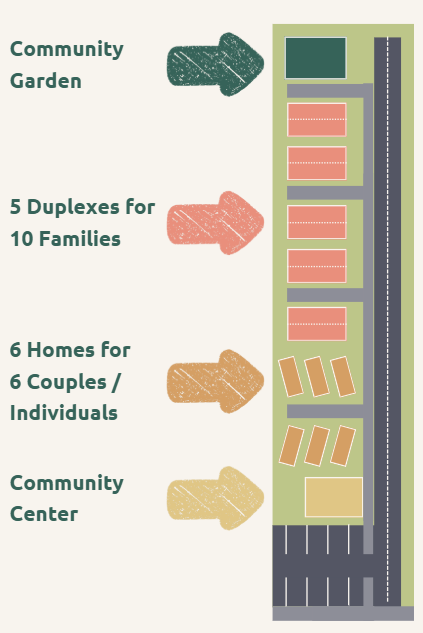CIRCLE CITY VILLAGE
ABOUT
Sanctuary Indy’s first permanent supportive housing community, offering connection and safety rather than isolation for chronically homeless individuals.
The Cycle of Chronic Homelessness
With your help,
we can disrupt the cycle.
Our Community-First Model stops stress from leading to crisis and a return to homelessness by providing a higher level of care:
High-Quality, Safe Homes
Community Partnerships
Intentional Social Living
24/7 Access to Peer Support
On-Site Professional Services
Master Site Plan
Our first supportive housing community is Circle City Village, situated on Lynhurst Drive.
In partnership with Lynhurst Baptist Church, Circle City Village is a place where our most vulnerable neighbors will remain housed for as long as they wish to stay.
Our residents will be engaged with community-oriented living arrangements and activities.
Phase One includes six tiny homes for six individuals or couples and is scheduled to be completed early 2026.
Phase Two includes five duplexes for 10 families and a community center and is scheduled to begin construction soon after.
House Sponsorship
Phase One Sponsorship Levels:
Full-House Sponsorship - $65,000
Half-House Sponsorship - $32,500
$50,000 - one all-new home
$15,000 - one year of programs for the formerly-homeless resident
Donate Online or Checks can be made out to Sanctuary Indy and mailed to
PO Box 30382, Indianapolis, IN 46230
Sponsor Benefits include:
volunteer engagement days
logo/name placement on build site
speaker slots at groundbreaking and ribbon-cutting ceremonies
social media featured posts
ceremonial plaque
Contact Erica Schneider at eschneider@sanctuaryindy.org for additional details.
Community Impact
This isn't just a humanitarian effort – it's good fiscal sense too!
The estimated annual average cost of a chronically homeless person to Indianapolis is $20,571 per year per resident, according to data from the “Estimated Costs of Homelessness in Indianapolis 2016” report.
Permanent Supportive Housing models can provide more individualized support and
save taxpayers approximately $4,500, per individual, per year.




